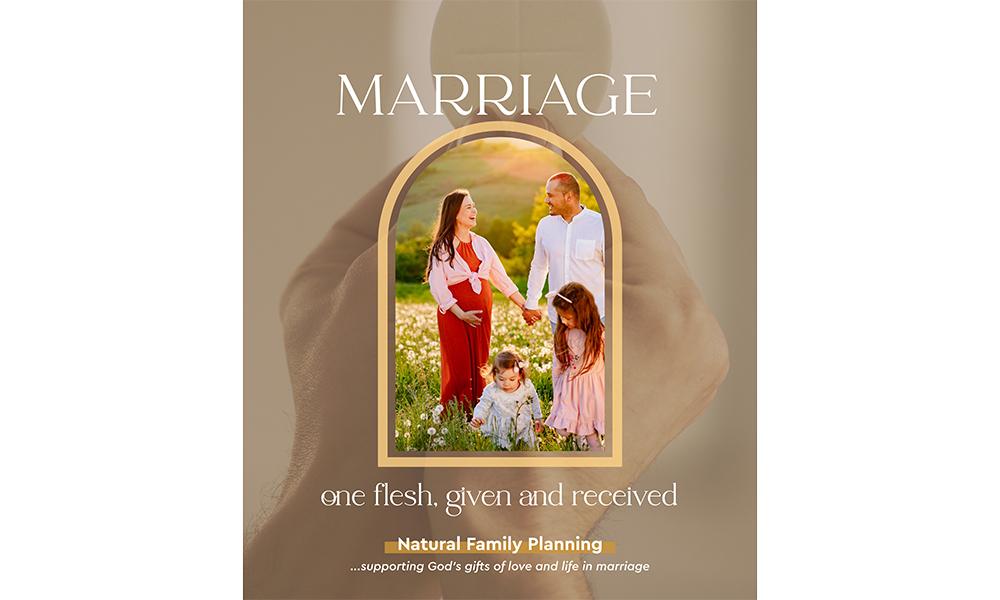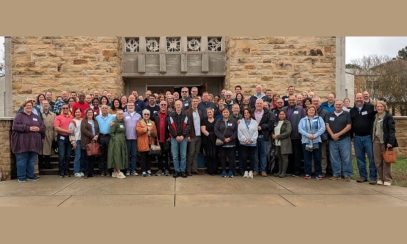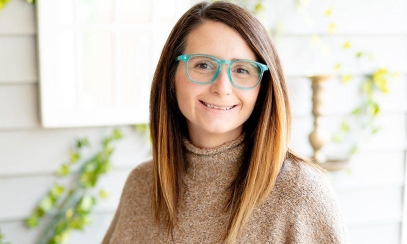
‘One flesh, given and received’
Natural family planning in marriage
Natural family planning in marriage
“Marriage: One flesh, given and received, Natural Family Planning, supporting God’s gifts of love and life in marriage” is the theme of this year’s national Natural Family Planning Awareness Week, which takes place July 23-29. These dates highlight the anniversary of the papal encyclical Humanae Vitae, which articulates Catholic beliefs about human sexuality, marriage, conjugal love, and responsible parenthood.
Although the topic can be uncomfortable for some, the United States Conference of Catholic Bishops (USCCB) promotes “NFP Week,” an educational campaign to celebrate God’s design for married love and the gift of life. The U.S. bishops have written the NFP methods are supportive of Catholic beliefs about married love because they “respect the God-given power to love a new human life into being.”
To promote the week in your parish, please consider some of the following ideas:
- Talk to your director of religious education (DRE) about scheduling NFP courses for RCIA candidates, as well as marriage prep and marriage enrichment opportunities.
- Reach out to any of the teachers on alabamanfp.org to take a refresher course or learn a different method.
- Host teenFEMM classes in your community or parish to help teenagers bond with their mothers and grow in dignity and respect for their bodies.
- Ask your pastor and parish secretary about keeping brochures and QR codes ready in the vestibule for resources for couples and young women.
- Print and distribute the NFP posters and materials provided the USCCB website for NFP Week. (https://www.usccb.org/topics/natural-family-planning/national-nfp-awareness-week)
- Talk to your friends, sisters, and co-workers about NFP.
- Reach out to Engaged Encounter to be a volunteer NFP witness couple. (https://www.birminghamcee.org/)
- Start Witness to Love Marriage ministry in your parish. (https://www.usccb.org/topics/natural-family-planning/media-kit)
- Ask your pastor to preach about marriage, contraception, and NFP during a homily or after Mass.
- Invite your pastor to learn more about NFP by reaching out to the diocese, an NFP teacher, or the Fertility Institute that offers classes specifically for priests. (https://www.alabamanfp.org/nfp-methods)
- Donate for further ethical and moral research on women’s health or for the training of medical professionals or teachers.
- Consider becoming an NFP teacher. For training opportunities, e-mail nfpc@bhmdiocese.org.
- Talk to your medical providers about the importance of ovulation for overall health – use https://www.alabamanfp.org/medical-research as a reference.
- Promote NFP through social media during July 23-29. (https://www.usccb.org/topics/natural-family-planning/media-kit)
Editor’s note: The following content may be unsuitable for some audiences due to its sensitive nature.
NFP setbacks
Occasionally, when I introduce my position at the diocese as an NFP Educator and Coordinator, I sometimes hear from women who explain that they tried Natural Family Planning, but it didn’t work for them. As they go on to explain, they had cycles that were difficult to chart, confusing, or difficult to establish patterns, and if married, their husbands weren’t fully supportive of its use. The conclusion? Instead of seeking further accurate education, trying a different method that fit better with their lifestyle and marriage, or seeking resolution for the root causes of their cycle variances to clear up their charts, they quit the discipline of fertility awareness charting. Upon visiting their doctor, they were recommended for or simply asked for an IUD or sterilization. Others pointed to their husbands and said it was easier for them to get a vasectomy since they finished growing their family with additional pregnancies, and the procedure was less risky for men then for women.
While we naturally think of the fruit of the union in marriage as children, the first gift and goal of marriage is unity, especially union of one flesh. The primary purpose of marriage is two-fold, equally both conjugal love and procreation. Children are not a right to this union, but rather a gift and a result of “one flesh.”
The bishops have written on this in “Married Love and the Gift of Life.” It would be a good read if interested.
Contraception in marriage
The barrier methods of contraception are pretty self-explanatory in becoming a physical barrier to the union of marriage. Often, I would ask, in regards to barrier methods, does it matter who is on the receiving or giving end? It really could be anyone, since the barrier makes the union impersonal. This is a physical device divorcing your union, and slowly and surely, it will continue to create a divide in the rest of your lives together. The barrier methods can also negatively impact a woman’s health, creating inflammation and an increase risk of infection.
How does hormonal contraception fit into a one flesh union? FEMM education teaches that ovulation is a sign of health. Women need the rise of estrogen to build strong bones, to stimulate the brain, blood cells, and the lining of the uterus to support life in a pregnancy. After ovulation, women love the effects of progesterone: better sleep, normalizing blood sugar levels, boost to the immune system, the normalization of blood clotting and the decrease in anxiety it provides. The synthetic hormones in contraception such as an IUD and the birth control (BC) pill do not offer any of these benefits, as they actually stop the body from ovulating and producing the right amount of these healthy hormones. These chemicals in the hormonal BC actually more closely resemble the chemical structure of testosterone in the body than they do estrogen and progesterone. The message the husband sends the wife in this union of hormonal contraception is “I love you, as long as your body stops ovulating like a woman, because I’d rather it be chemically controlled than respected” or the wife’s message to her husband is, “I will only love you and receive you as long as my reproductive system is put into a chemically induced coma to prevent having any (more) children with you.”
All of these “I love you” statements are conditional, they are not showing and demonstrating unconditional love of openness to life. Although they may be one flesh, women in this situation are not free to give of their complete selves, nor are their husbands receiving them completely. There also comes a small risk of unintended abortions. If the woman’s body were able to have a break through ovulation and conceive, the hormonal contraception will not likely allow the newly conceived baby to implant in the uterus. She would then “miscarry,” and may not have even known she was pregnant at all, as an at-home urine pregnancy test and blood test can only show a positive result after implantation when HCG rises. The only way to determine the possibility of ovulation is to chart and/or have an ultrasound. The only definitive proof of ovulation is through an ultrasound, blood lab work, and/or pregnancy.
Sterilization as a form of contraception (not out of medical necessity to stop a hemorrhage and loss of life) also contradicts “one flesh, given and received.” Instead of loving one another in totality, either the body parts responsible for fertility are removed or surgically altered to create a void in the physical receiving and giving of one another. Often for women who had necessary medical reasons for a partial or total hysterectomy will still benefit spiritually from episodes of periodic abstinence as demonstrated through practice of NFP. If she still has her ovaries intact, she can still monitor signs of ovulation for health benefits through observing basal body temperature and/or implementing the Marquette method. In this regard she can observe a period of abstinence during the ovulatory phase so as to prevent the contraceptive effect from surgery. In this way, she and her husband are still respecting the phases of her cycle and their respective fertility as God designed it.
Again, the bishops provide further reading on the matter, available at usccb.org
Benefits of charting
So what other family planning options are left to live out this vocational call to marriage? Are all Catholics called to throw caution to the wind, leaving their family size up to the god of chance? No. In order to prudently discern not just the number of kids, but also when women need to chart their cycles. Learning to chart is learning how to respect and honor the female body and her dignity through learning God’s design and imprint of motherhood in her body. Even for couples seeking large families owe it to their marriage and future children to learn to chart in order to restore health first for the best outcomes for both mother, baby in the pregnancy, and any older siblings. Many causes of ovulatory dysfunction also contribute to miscarriage and premature birth, as well as other health complications for mom and baby. It’s also hard to fully give a gift if you don’t fully know about it or own it. Charting helps identify biomarker cues that need to be addressed before larger, harder-to-ignore symptoms manifest which could ultimately affect the couple’s ability to conceive, quality of life, or even death. Frequently NFP teachers will see early signs of dysfunction with thyroid, insulin resistance and diabetes, endometriosis, and polycystic ovarian syndrome/disease wreaking havoc by complicating observations and making ovulation hard to identify. By seeking answers to the “why’s” in observations of charting, your gift of self to your spouse grows through that knowledge. You’re also free to seek sound medical health care to resolve these hormonal disturbances by restoring healthy ovulation and living your life optimally to better know, love, and serve God. Through the discipline of observing and charting cycles, you are still free to choose how many kids you want to have and when—truly living out in the fullness of your marriage “one flesh, given and received.”
In terms of growing a family, charting to uncover root fertility disturbances and treating those root causes, as Fertility Education and Medical Management (FEMM) is trained to do, not only helps to restore health to mom for a better life overall but also increases her chances of conceiving when she wants to. Naprotechnology is a great option for those in need of surgery, but many times surgery doesn’t need to be the first course of action, and instead, good medicine practice can restore ovulation. Both FEMM and Naprotechnology take into account the male fertility factor, too, and also have ethical guidelines for the couple to overcome those challenges. The process of in vitro fertilization (IVF) removes the one flesh personal union and instead places the union in a laboratory, with several medical health care professionals intimately involved in the conception. Seeking respectful solutions to fertility problems allows the dignity of the marriage and union to be left intact. If after seeking good medical care and solutions to these obstacles to conception, a couple still finds themselves without children, they can seek spiritual guidance to discern the specific paths to what living out parenthood looks like for them, whether that be adoption, foster-care, or spiritual parenthood to God’s children of all ages, from birth to natural death. If this is your cross, please seek support at springsinthedesert.org. Charting through treatments to restore fertility can build an appreciation for God’s love, His desire for your love, Jesus’ Passion, the Eucharist, and the path to Heaven through your marriage.
To learn more visit alabamanfp.org or e-mail nfpc@bhmdiocese.org.



